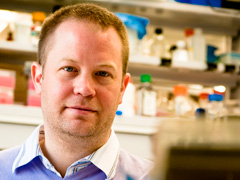The Right Fit
By Alisa Kim
For most PhDs, a postdoctoral fellowship is a stepping-stone along the path to a career in academia. Though relatively short, the protected research time and mentoring afforded by postdoctoral training are important in the development of a budding scholar.
"A postdoc is a transient position," says Dr. Ross La Motte-Mohs, who is in the final year of his postdoctoral fellowship at Sunnybrook Research Institute (SRI). "You're not mature enough to run your own lab, but you're gaining the skills to run your own lab, and do it effectively."
La Motte-Mohs is studying human T cell development with SRI senior scientist Dr. Juan Carlos Zúñiga-Pflücker. Deciding to move to Toronto to do his fellowship was not easy for this American; he met with 10 researchers before accepting his current position.
Foremost was his desire to work with a leading scientist in immunology who could help him reach his goal of becoming an independent investigator. "If you want to do an effective postdoc, you have to look at several factors," says La Motte-Mohs. "The first is that the PI [principal investigator] has published in the last year or two, and that he has a well-funded lab. In thinking about where I wanted to be five or 10 years down the line, I thought that [Zúñiga-Pflücker] could help get me there." The second, he says, is the work itself. "I had my choice of projects, but what really piqued my interest was the possibility of generating T cells from human embryonic stem cells."
Also important for La Motte-Mohs were the interpersonal dynamics within the lab. During a visit to Toronto to meet Zúñiga-Pflücker, he grilled lab members about their job satisfaction and observed their interactions with one another. "You need to feel there is professionalism and camaraderie in the lab. Understanding lab dynamics is as important as having a good project, funding and getting along well with your mentor," he says.
Throughout his fellowship, La Motte-Mohs has learned the fundamentals of running a lab—writing papers, forming collaborations with other researchers and managing people. But the most valuable skill he has gained is writing grant proposals. "The hardest thing and most important priority for a PI is writing successful grants and bringing grant money in," he says. "It's best to learn that skill as a postdoc." La Motte-Mohs made every effort to obtain grant writing experience and sought Zúñiga-Pflücker's feedback on applications. This diligence paid off. In addition to being awarded a three-year fellowship from the Canadian Institutes of Health Research, he has received two grants from the Ontario HIV Treatment Network.
As his training at SRI concludes, La Motte-Mohs is looking forward to the next phase of his career. His advice for prospective fellows: do your research and be selective. "Figure out what is out there, who is doing it, what your options are and where you want to live. Investigate the lab you want to go to and don't take just anything because it's available."
PDF / View full media release »


